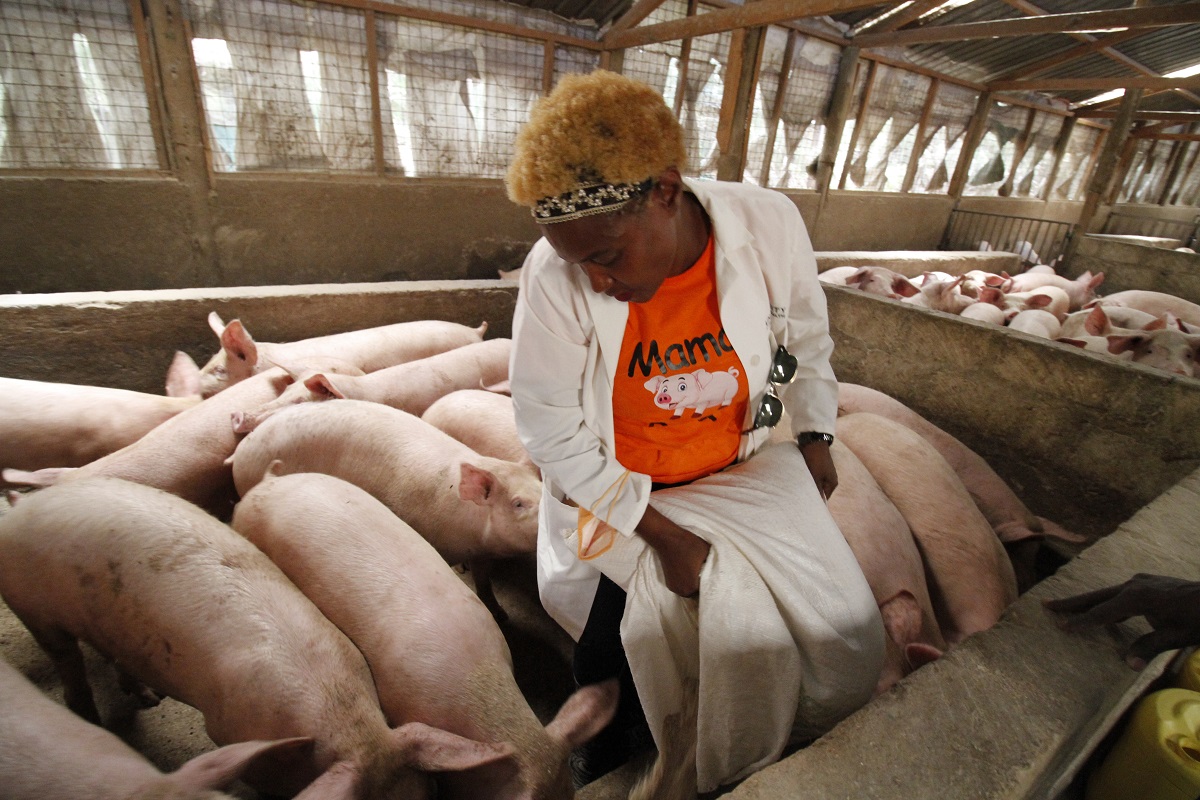
Kenyan Livestock Farmers Appeal for Importation of GM Animal Feeds
January 19, 2022| |
Livestock farmers in Kenya are staring at a bleak future following a dire shortage of livestock feeds, a situation that has exorbitantly pushed up livestock production costs in the country. Now, farmers are appealing to the Government to allow importation of genetically modified (GM) feed ingredients which are relatively cheap and readily available on the global market.
The dairy, pig and poultry farming sub sectors are hard hit that some farmers have downscaled their production or even been forced to close down due to unavailability or unaffordability of the feeds locally. Thirty-six feed millers have closed shop within the last one year owing to scarcity of raw materials for manufacture of feeds.
Daiichi Farm, one of the large scale pig farms in Kenya, has borne the brunt of the feed shortage and currently faces an imminent closure unless the feed situation is addressed with immediate effect. Following the feed scarcity, the farm has downsized its production from 3,000 to 1,500 pigs and cut down the workforce by more than half.
Pig production costs have jumped up from 30% to 65% due to the skyrocketing prices of animal feeds. "If the cost has gone up to 65%, it means that the profit margin has been eaten into. The high cost of production has negatively impacted the operations at Daiichi Farm, and we are at a loss," said Jennifer Koome, the Director of Daiichi Farm.
The Director regretted that the shortage of feeds has forced them into rationing feeds for their pigs, thus compromising the quality and weight of their animals. "Due to the food ratios, the pigs are not adding weight as fast as they should, and this lowers their selling prices," she added.
Michael Koome, the chairperson and co-owner of the farm, made a passionate appeal to the Government to allow importation of GM yellow maize and soybean, two major ingredients used in manufacturing animal meals. Mr. Koome warned that if the feed scarcity persists, their farm and others will close down. "We are a net importer of the meat eaten locally. Some of this meat comes from jurisdictions that have for a very long time been using GMO animal feeds," he said.
In August 2021, feed manufacturers in the country petitioned the Government to lift the ban on importation of GM foods and allow them to import GM maize and soybean. However, the government through a Gazette notice issued on December 10, 2021 exempted import duty on importation of non-GMO raw materials used in the manufacture of animal and chicken feeds. While at face value the duty waiver appears an attractive offer, a thorough analysis by a Kenyan think tank – Tegemeo – indicates this will not bring down the cost of feed. This is because there is a shortage of conventional soybean and maize globally, and over 80% of the soybean supplies and 30% of the maize available on the international markets are genetically modified.
The Association of Kenya Feed Manufacturers (AKEFEMA) has appealed for a review of the Gazette notice. "We are asking the Government to review the Gazette notice and adopt the European Standard at 99.1% non-GMO," said AKAFEMA's Secretary General Dr. Martin Kinoti.
For more information, contact Dr. Margaret Karembu at mkarembu@isaaa.org.
| |
You might also like:
- Kenyan Feed Manufacturers Ask Gov't to Allow Importation of GMO Feed Materials
- Long Wait Over as Kenya Finally Commercializes Bt Cotton
- Kenyan Government Banks on Bt Cotton to Revive Textile Industry
Biotech Updates is a weekly newsletter of ISAAA, a not-for-profit organization. It is distributed for free to over 22,000 subscribers worldwide to inform them about the key developments in biosciences, especially in biotechnology. Your support will help us in our mission to feed the world with knowledge. You can help by donating as little as $10.
-
See more articles:
-
News from Around the World
- Community of Experts Presents Progressive Regulatory Approaches for Animal Biotech
- Kenyan Livestock Farmers Appeal for Importation of GM Animal Feeds
- Discovery Finds Plants Rely on CLASSY Gene Family to Diversify their Epigenomes
- Gene Discovery to Make Superman Sorghum that Resists Broad Spectrum of Fungi
- Researchers to Develop Roundworm-Resistant Sweet Potatoes
- HKU Scientists Discover Mechanisms to Make Salt Tolerant Soybeans
- APAARI Presents Lessons on GM Maize Adoption from the Philippines
- US Supports Further Research of Bt Eggplants in Bangladesh, Philippines
-
Research Highlights
- Chinese Scientists Discover Universal Key to Solve Self-Incompatibility of Potatoes
- Researchers Produce Quinoa Hybrids Thanks to Genome Sequencing
-
Plant
- CRISPR-based Tool Reverses Insecticide Resistance in Fruit Flies
- South African Seed Growers Appeal for NBT Not to be Regulated as GMOs
-
Read the latest: - Biotech Updates (January 21, 2026)
- Gene Editing Supplement (January 28, 2026)
- Gene Drive Supplement (February 22, 2023)
-
Subscribe to BU: - Share
- Tweet

